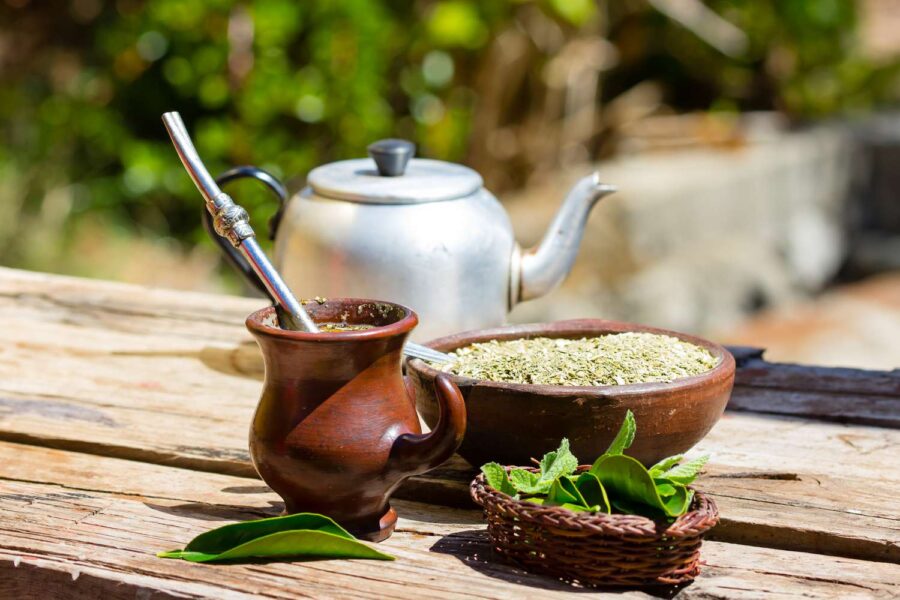Uncovering the Benefits and Risks of Yerba Mate
Have you ever heard of yerba mate? If not, don’t worry—you’re not alone! Many people assume yerba mate is just a flavor of tea, but it’s so much more than that. It’s actually an herbal tea from South America with plenty of potential health benefits, as well as potential risks. In this article, let’s take a closer look at these benefits and risks to uncover what yerba mate has to offer.
1. What is Yerba Mate?
Yerba Mate is an herbal tea made from the leaves and stems of a holly tree native to South America. Traditionally, it is prepared in a ceremonial way by steeping the leaves in hot water. The drink is usually served in a hollow gourd and sipped through a metal straw known as a bombilla. The taste of Yerba Mate is bitter but can be sweetened with sugar, honey, or lemon juice.
Health Benefits
- Yerba mate is renowned as having powerful health benefits due to its rich vitamin, mineral and antioxidant content.
- It is an energy booster, helping to improve alertness and physical performance.
- Yerba mate may help regulate blood sugar levels, aiding in weight loss and preventing diabetes.
- The antioxidants present in Yerba mate provide potential protection against cellular damage.
- It may reduce inflammation, improve cognitive function and enhance mood.
Potential Risks
- Yerba mate has been identified as a possible carcinogenic due to its high levels of polycyclic aromatic hydrocarbons (PAH).
- Drinking large quantities of Yerba mate can lead to nausea, stomach cramps, and elevated heart rate.
- Individuals with heart disease or diabetes should drink Yerba mate with caution.
- It can interact with medications such as warfarin, ibuprofen, sedatives, and anesthetics.
2. Uncovering the Benefits of Yerba Mate
Health-Promoting Effects
Yerba Mate is renowned for its high concentration of valuable compounds such as vitamins, minerals, antioxidants, and micronutrients. The unique combination of these compounds has been linked to various health benefits, such as boosting energy and reducing fatigue, improving mental and physical performance, aiding in weight loss, and supporting healthy skin. Furthermore, yerba mate has been found to reduce inflammation, regulate the immune system, and provide antifungal and antiviral properties.
Potential Side Effects
Drinking yerba mate does come with some potential side effects.
- It’s high in caffeine, and can lead to nervousness, restlessness, headaches, or insomnia when consumed in large amounts.
- It can increase the risk of certain types of cancer due to its high levels of polycyclic aromatic hydrocarbons (PAHs).
- It may interfere with blood clotting, which could put you at risk of uncontrolled bleeding.
- It can reduce fertility in men, and increase the risk of miscarriage in pregnant women.
It’s important to be mindful of these potential side effects, and always talk to your doctor if you have any concerns.
3. Taking a Look at the Risks of Yerba Mate
Now we’ll take a look at some of the risks associated with consuming yerba mate on a regular basis. It’s important to remember that any health risks associated with yerba mate are typically minor and can be mitigated with proper use.
- Caffeine Addiction: Yerba mate contains a modest amount of caffeine, which can make users susceptible to becoming addicted. It’s important to practice moderation when consuming yerba mate and other caffeinated beverages.
- Stress: Yerba mate’s mild stimulant effects can induce feelings of stress, anxiety, and insomnia. If you are feeling too stimulated, it’s best to reduce or stop consumption.
- Upset Stomach: Yerba mate is a diuretic, which means it can cause dehydration and an upset stomach if over-consumed.
- Heart Problems: Research has shown that prolonged ingestion of yerba mate could lead to an increased risk of coronary heart disease.
- Stroke: Some studies suggest there might be a link between yerba mate consumption and an increased risk of stroke, although the research is inconclusive.
It’s also important to note that pregnant women and people who are breastfeeding should not consume yerba mate because it contains caffeine. For those with an underlying medical condition, it’s best to speak to your doctor before drinking yerba mate.

4. Is Yerba Mate Right for You?
- Precautions to Take Before Trying Yerba Mate
Before deciding if yerba mate is a good choice for you, you should take some precautions. This includes talking to your doctor if you are pregnant or have any preexisting conditions. Your doctor can help you determine if yerba mate is the right choice for you or if you need to look for an alternative.
Additionally, you should keep an eye on how your body responds as you drink yerba mate. Monitor your Food and Drug Administration caffeine intake, keep track of any effects, and stop drinking yerba mate if you don’that it is causing any negative effects.
- Benefits of Yerba Mate
Yerba mate can provide a variety of health benefits. For example, it can boost energy levels and alertness and improve mental focus and clarity.
It is also known to help improve digestion, lower cholesterol levels, and provide antioxidant protection. It has also been known to benefit blood sugar levels, fight inflammation, and even help regulate hormones.
It is also rich in nutrients, including vitamins and minerals. It also contains caffeine, as well as other stimulants like theobromine and theophylline. All of these components can help promote health and well-being.
Conclusion
We hope this article has given you a better understanding of the health benefits and risks of yerba mate. Ultimately, as with anything else, it’s important to do your own research and make sure it’s right for you. Cheers to good health!
